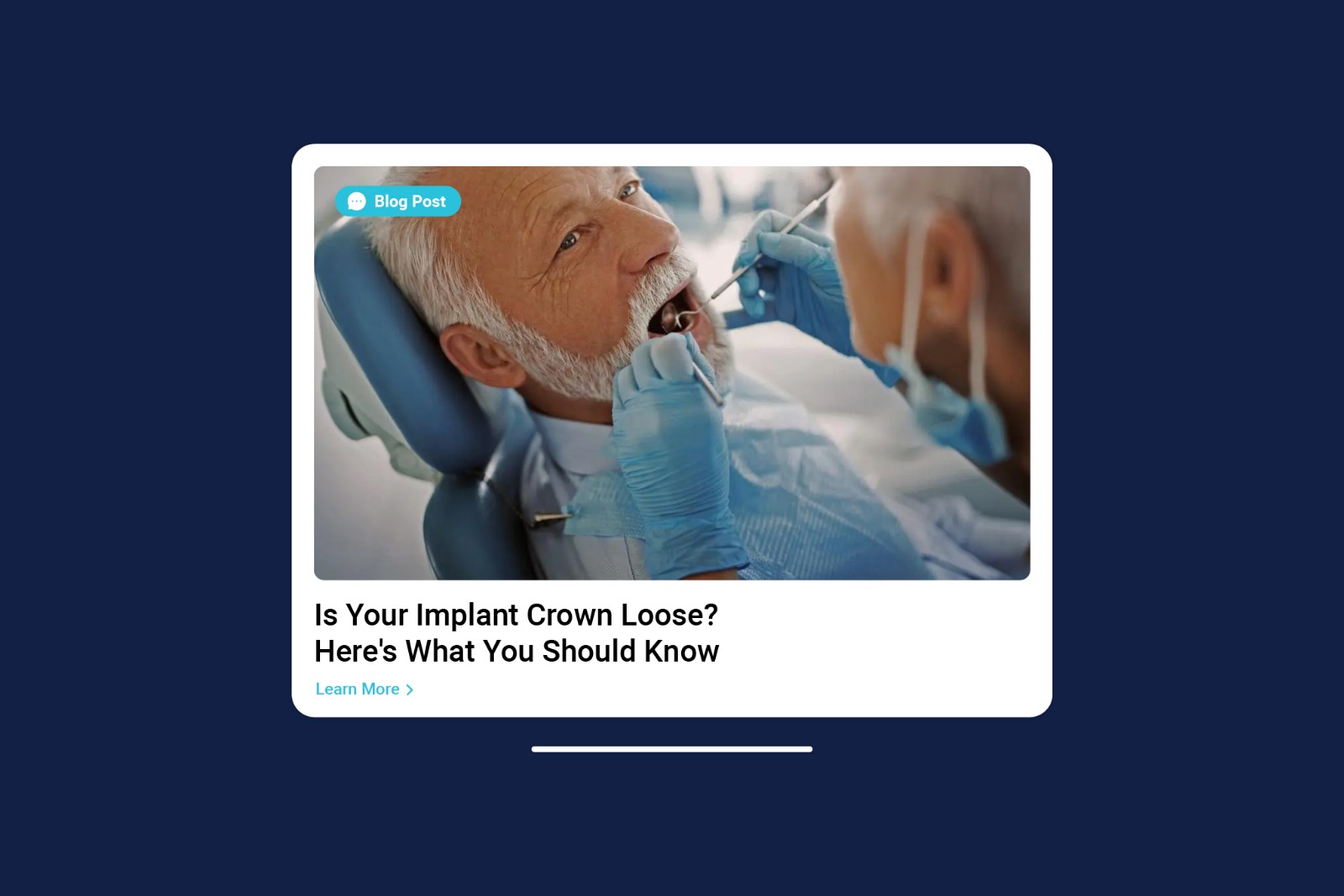A loose implant crown can be unnerving especially when you’ve invested time and money into your dental implants. The good news: in many cases, a loose crown is fixable and doesn’t mean your implant has failed. The key is knowing what to do right now and getting an implant dentist in Sunnyvale to assess it promptly.
What an Implant Crown Is (and Why It Can Loosen)
A dental implant has three parts:
- Implant – the titanium post fused to your jawbone
- Abutment – the connector piece
- Crown – the tooth-colored cap you see and chew with
An implant crown can be attached in two ways:
- Screw-retained: the crown is secured to the abutment with a tiny screw and covered with a small filling.
- Cement-retained: the crown is cemented onto the abutment.
A loose feeling often comes from the crown or abutment, not the implant itself. That’s reassuring because tightening or re-cementing is typically straightforward when addressed early.
Signs Your Implant Crown Is Loose
- A slight wiggle when you press the crown with your tongue or finger
- Clicking or tapping sounds when chewing
- Food getting trapped around the implant more than usual
- Soreness in the surrounding gum tissue
- A change in your bite (teeth no longer meet the same way)
- The crown spins or feels high when you bite down
If you notice any of these, schedule a quick dental appointment in Sunnyvale, the sooner we see you, the easier (and cheaper) the fix.
Immediate Steps to Take
1) Stop chewing on that side.
Avoid hard or sticky foods. Continued pressure can strip the screw, crack porcelain, or irritate the gum.
2) Don’t try to tighten or glue it.
DIY fixes (superglue, pliers, “dental” glue) can damage the abutment screw, trap bacteria, or lock in a bad bite.
3) If it comes off, keep everything.
Place the crown (and any small parts) in a clean container or bag. Bring it to us, we can often re-seat it the same day.
4) Rinse gently if sore.
Warm saltwater rinses can calm irritated gums while you wait to be seen.
5) Call for a same-day visit.
We reserve time daily for urgent issues. Search “walk-in dentist near me” or contact Trident Smiles Dental directly for same-day dentist Sunnyvale care.
Common Reasons Implant Crowns Loosen
- Abutment screw loosening: Over time (or with heavy bite forces/bruxism), the tiny screw can back out slightly. We re-tighten to manufacturer torque specs and replace if worn.
- Cement failure: For cement-retained crowns, the cement can wash out or break down especially if excess forces or leakage occurred.
- Bite imbalance: A crown that’s “high” or a changing bite can overload the implant and loosen components.
- Para-function (grinding/clenching): Nighttime grinding (bruxism) stresses implant components. A night guard often solves this.
- Trauma: A hard bite on something (olive pit, popcorn kernel) or sports impact can loosen or fracture a crown.
- Inflammation or infection: Irritated gum tissue or peri-implantitis (gum/bone inflammation around implants) can mimic looseness and must be treated promptly.
How We Fix a Loose Implant Crown at Trident Smiles Dental
We keep this process efficient, comfortable, and precise ideal for busy professionals who need a quick dental appointment in Sunnyvale.
1) Diagnose the source
- Clinical exam to see if the crown, abutment, or implant is moving
- Digital X-rays to check bone levels and component fit
- Bite analysis to assess occlusion and overload spots
2) If screw-retained:
- Remove the small filling covering the access hole
- Inspect, then re-torque the abutment screw to the manufacturer’s specifications
- Replace a stripped or damaged screw if needed
- Verify fit, balance the bite, seal the access with a tooth-colored filling
3) If cement-retained:
- Carefully remove the crown (if it hasn’t already come off)
- Clean the crown and abutment, verify seating and margins
- Re-cement with appropriate implant-safe cement
- Adjust bite so the implant shares force properly
4) If the crown is damaged:
- Repair chips (when possible) or recommend a replacement crown
- Discuss materials (zirconia, porcelain-fused-to-metal, all-ceramic) that best fit your bite and esthetics
5) If gums are inflamed:
- Treat tissue irritation or peri-implantitis with debridement, localized therapy, and home-care coaching
- Create a follow-up maintenance plan
6) Protect the repair
- Custom night guard if there’s grinding
- Hygiene coaching for implants (special floss, water flosser, interproximal brushes)
Most patients leave the same day with a stable crown and a balanced bite.
When a Loose Crown Signals Bigger Problems
While most cases are simple mechanical issues, we’ll evaluate for:
- Peri-implantitis: bleeding, swelling, or bone loss around the implant
- Implant mobility: if the implant itself moves, that’s more serious and needs immediate care
- Chronic overload: repeated loosening may mean your bite needs re-balancing or a new crown design/material
Catching these early keeps your dental implant healthy for the long term.
Prevention Tips to Keep Your Implant Crown Secure
- Keep up with cleanings: Professional maintenance 2x/year reduces inflammation around implants.
- Use the right tools: Floss threaders, water flossers, and interproximal brushes clean under the crown margins better.
- Wear a night guard: If you clench or grind, a guard protects implant components.
- Watch what you chew: Avoid cracking ice, hard candies, or using teeth to open packages.
- Ask for a bite check: If your bite feels “off,” schedule a quick adjustment to prevent overload.
- Return if it loosens again: Recurrent loosening needs a deeper look, don’t wait.
Costs, Insurance, and Fast Access
- Insurance: Many PPO plans help cover evaluation, X-rays, re-cementing, and minor repairs.
- Financing: For uncovered services, we offer Sunbit and CareCredit with flexible monthly payments.
- Access: We’re a Sunnyvale dental clinic with same-day and walk-in options for urgent implant issues.
Our front desk verifies benefits ahead of time and gives you a clear, written estimate, no surprises.
